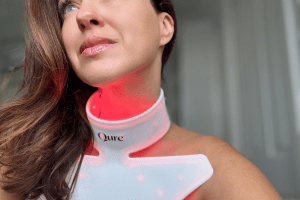Iron Out
The best way to find out if you’re low in iron is to have your blood tested by your GP. This will tell you not only if you’re deficient, but also where you’re sitting on the spectrum; the most serious cases of iron deficiency are those who are anaemic, where the blood doesn’t have enough healthy red blood cells. If you do then receive a diagnoses for iron deficiency, in most cases it’s easy to cure. The most common suggestion to counter low iron is through iron supplements. Now, if you’ve ever had an iron supplement, you might be familiar with the symptoms (ahem… constipation), so it might help to take liquid iron – absorption into the body tends to be gentler on the stomach and digestive system.
Note: Take iron supplements only as directed by your health care professional. Liquid iron supplements may stain teeth.
Bleak Sleep
Just because you may sleep for 8 hours a night doesn’t mean you are getting the sleep you need. It’s ideal to hit three or four full REM [rapid eye movement] cycles per night in order to feel rested. It’s the cycle your body falls into when you hit deep sleep or dream, accounts for about 20-25% of total sleep time and affects how well rested you are.
One way your REM cycle can be negatively affected is by using your phone or computer before sleep. This is because the soft blue glow from your cell phone, tablet or computer can affect your eyes. Many doctors have recommended to turn off your electronics at least 30 minutes prior to sleeping. If you must be on your phone before bed, it is suggest that you turn on the “night-mode” feature of your phone to decrease this blue glow.
Another factor could be your bedtime beverage choice. Coffee and alcohol intake have a big impact on your ability to have a peaceful sleep. Try and decrease, or eliminate, caffeine after 3pm – it can have a lasting affect on your heart rate and it can increase anxiety, making it difficult to focus on sleep. Alcohol, on the other hand, although it’ll help you fall asleep, (especially red wine) once the initial effects wear off, the sugar content will wake you up in the night, disturbing your REM cycle.
Sun Ban
Summer is over and the days have been getting colder and cloudier, so your natural hit of vitamin D is on the decline. The “sunshine vitamin” helps aid stronger bones, improved muscle function and energy levels. Your body can naturally produce vitamin D, particularly when the skin is exposed to sun (in small doses) but when there’s a lack of sun, you’ll start to notice things like energy levels dropping pretty significantly. Certain foods like fish, egg yolks, and milk are a great source of vitamin D and supplements are also available over the counter, but always check with your doctor first. But, about 90% of Vitamin D comes from sunshine, so try to get some early morning or late arvo sunshine whenever the weather permits.
Sloppy sitter
A lot of us are guilty of being changed to our desks, sitting for hours at a time per day and not getting the recommended 10,000(ish) steps a day. In fact, the average person sits for 9-12 hours a day in front of their screen and manages less than half their ideal daily step quota.
Simply walking more, getting up from your work screen every hour and perhaps doing a few basic exercises at your chair could help you fall asleep faster and have a deeper sleep. Also, exercising at 3 times a week improves our circadian rhythms (the 24 hour cycle of our physiological process), which helps us be more alert through the day a deeper sleep at night. You can also run the risk of being “unconditioned” – meaning your muscles fatigue easily causing your body to become exhausted. Try using movement reminder apps like Stand Up! and Move to get prompts throughout the day when deadlines make us idle.
Thyroid Troubles
The thyroid is a gland in your neck that dictates your metabolic rate and affects things like digestion, weight, energy and mood which ultimately affect your sleep. Thyroid issues can be caused by gluten sensitivity, nutrient deficiencies and inflammation stemming from a high-carb or high sugar diet. Depending on if it’s overactive (Hyperthyroidism) or underactive (Hypothyroidism), will give varying symptoms, but both cause fatigue. So, if you’re concerned about your thyroid (a common initial indicator is the ability or inability to gain/lose weight) see your GP and have it tested. It’s best to follow medical recommendations when treating thyroid problems, but lowering refined carbohydrate intake, gluten intake and including iodine supplements in your diet have been known to assist thyroid function.
Emotional Stress
Our mental health has a lot to answer for when it comes to physical fatigue. The stress in our lives can really take its toll, in almost all facets of our life and wellbeing. Stress keeps us awake at night and distracted and exhausted through the day. While we’re not going to be able to iron out the stressors in your life right now, there are ways to combat stress so it doesn’t have such a significant negative effect on your body, brain and well, actually everything. We know you’ve heard this 10,000 times, but seriously, try and meditate every morning. You don’t need to be a master yogi to settle your mind for 10 minutes every day. In fact, there’s an app for that. Guided meditations are especially effective for those who find it difficult to tune out, so apps like Calm and HeadSpace are excellent for women on-the-go.
Story by Catherine Barnes







Katrina
I had an iron deficiency and found that once I started taking supplements, I had so much more energy and wasn’t exhuasted 24/7. If you can’t seem to get over your exhaustion, I recommend checking you iron because it makes a huge difference!
Emily
I have always had a difficult time falling asleep at night, I just looked into the beauty powder and it looks promising. Has anyone tried it/ has positive results??